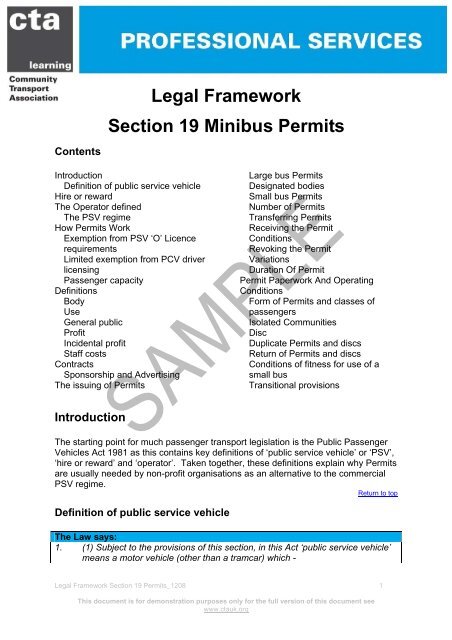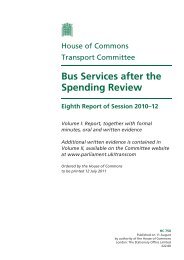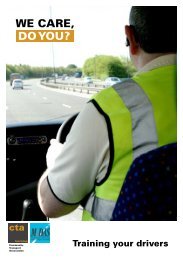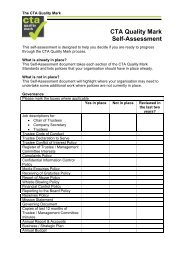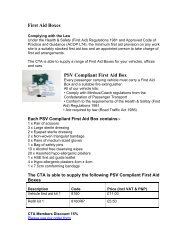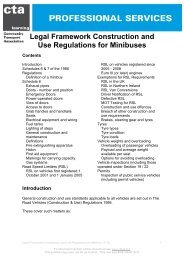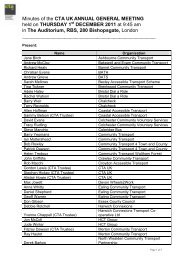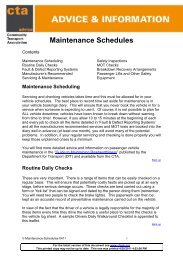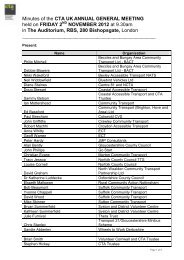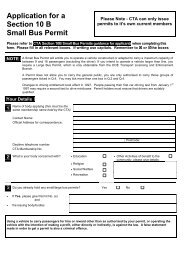Legal Framework Section 19 Minibus Permits - Community ...
Legal Framework Section 19 Minibus Permits - Community ...
Legal Framework Section 19 Minibus Permits - Community ...
You also want an ePaper? Increase the reach of your titles
YUMPU automatically turns print PDFs into web optimized ePapers that Google loves.
<strong>Legal</strong> <strong>Framework</strong><br />
<strong>Section</strong> <strong>19</strong> <strong>Minibus</strong> <strong>Permits</strong><br />
Contents<br />
Introduction<br />
Definition of public service vehicle<br />
Hire or reward<br />
The Operator defined<br />
The PSV regime<br />
How <strong>Permits</strong> Work<br />
Exemption from PSV ‘O’ Licence<br />
requirements<br />
Limited exemption from PCV driver<br />
licensing<br />
Passenger capacity<br />
Definitions<br />
Body<br />
Use<br />
General public<br />
Profit<br />
Incidental profit<br />
Staff costs<br />
Contracts<br />
Sponsorship and Advertising<br />
The issuing of <strong>Permits</strong><br />
Large bus <strong>Permits</strong><br />
Designated bodies<br />
Small bus <strong>Permits</strong><br />
Number of <strong>Permits</strong><br />
Transferring <strong>Permits</strong><br />
Receiving the Permit<br />
Conditions<br />
Revoking the Permit<br />
Variations<br />
Duration Of Permit<br />
Permit Paperwork And Operating<br />
Conditions<br />
Form of <strong>Permits</strong> and classes of<br />
passengers<br />
Isolated Communities<br />
Disc<br />
Duplicate <strong>Permits</strong> and discs<br />
Return of <strong>Permits</strong> and discs<br />
Conditions of fitness for use of a<br />
small bus<br />
Transitional provisions<br />
Introduction<br />
The starting point for much passenger transport legislation is the Public Passenger<br />
Vehicles Act <strong>19</strong>81 as this contains key definitions of ‘public service vehicle’ or ‘PSV’,<br />
‘hire or reward’ and ‘operator’. Taken together, these definitions explain why <strong>Permits</strong><br />
are usually needed by non-profit organisations as an alternative to the commercial<br />
PSV regime.<br />
Return to top<br />
Definition of public service vehicle<br />
The Law says:<br />
1. (1) Subject to the provisions of this section, in this Act ‘public service vehicle’<br />
means a motor vehicle (other than a tramcar) which -<br />
<strong>Legal</strong> <strong>Framework</strong> <strong>Section</strong> <strong>19</strong> <strong>Permits</strong>_1208 1<br />
This document is for demonstration purposes only for the full version of this document see<br />
www.ctauk.org
(a)<br />
(b)<br />
being a vehicle adapted to carry more than eight passengers, is used for<br />
carrying passengers for hire or reward; or<br />
being a vehicle not so adapted, is used for carrying passengers for hire or<br />
reward at separate fares in the course of a business of carrying passengers.<br />
Source: Public Passenger Vehicles Act <strong>19</strong>81<br />
<strong>Minibus</strong>es are adapted to carry more than eight passengers, and so therefore come<br />
into (a) above.<br />
If a vehicle with a passenger capacity of less than nine is to be run without being part<br />
of a business where separate fares are charged, it will not be a PSV. It is possible<br />
under section 1(4) of the same Act to charge fares on a non-profit basis. In any<br />
other situation the vehicle may be subject to taxi, private hire or even PSV<br />
legislation. This legal framework for ‘car-sharing’ - which is used extensively in the<br />
community transport sector - is discussed in <strong>Community</strong> Car Schemes & the Law.<br />
The Law says:<br />
(2) For the purposes of sub section (1) above a vehicle ‘is used’ as mentioned in<br />
paragraph (a) or (b) of that sub section if it is being so used or if it has been<br />
used as mentioned in that paragraph and that use has not been permanently<br />
discontinued.<br />
Source: Public Passenger Vehicles Act <strong>19</strong>81<br />
This makes it clear that once a minibus has been used for hire or reward, it will be<br />
considered to be a public service vehicle at all times, not just when it happens to be<br />
carrying passengers. The only way to avoid this is to permanently discontinue its<br />
use in terms of these provisions. In practice, convincing evidence would be needed<br />
to show that this discontinuance was, in fact, permanent.<br />
One possible scenario is that operators carrying people seated in wheelchairs find<br />
that they can lay the bus out with a mix of seats and wheelchair spaces which adds<br />
up to less than nine, leaving a number of removable seats in storage. However, the<br />
bus is still capable of carrying more than eight, and therefore remains a PSV.<br />
In order to demonstrate that the seating reduction was permanent, the following<br />
would seem to be necessary (a copy of all letters should be kept):<br />
• a formal letter to the DVLA (Vehicle <strong>Section</strong>) at Swansea<br />
• a change of MOT class<br />
• removal of any Permit disc displayed on the vehicle<br />
• written notification to the insurer<br />
• affixing a notice of reduced capacity to the bus, and removal of any notice or<br />
sign indicating a higher capacity<br />
There are considerable drawbacks in converting a ‘minibus’ into a ‘car’. A vehicle<br />
which is constructed or adapted to carry eight or fewer passengers is a ‘car’, and the<br />
relevant construction standards for cars would apply to it. This would, for example,<br />
<strong>Legal</strong> <strong>Framework</strong> <strong>Section</strong> <strong>19</strong> <strong>Permits</strong>_1208 2<br />
This document is for demonstration purposes only for the full version of this document see<br />
www.ctauk.org
include the need for all seats to be fitted with seat belt anchorages to M1 (car<br />
strength) standard - a substantially higher standard than that which applies to small<br />
or large buses.<br />
Return to the top<br />
Hire or reward<br />
The Law says:<br />
(5) For the purposes of this section and Schedule 1 to this Act -<br />
(a)<br />
(b)<br />
(c)<br />
a vehicle is to be treated as carrying passengers for hire or reward if payment<br />
is made for, or for matters which include, the carrying of passengers,<br />
irrespective of the person to whom the payment is made and, in the case of a<br />
transaction effected by or on behalf of a member of any association of<br />
persons (whether incorporated or not) on the one hand and the association or<br />
another member thereof on the other hand, notwithstanding any rule of law as<br />
to such transactions;<br />
a payment made for the carrying of a passenger shall be treated as a fare<br />
notwithstanding that it is made in consideration of other matters in addition to<br />
the journey and irrespective of the person by or to whom it is made;<br />
a payment shall be treated as made for the carrying of a passenger if made<br />
in consideration of a person’s being given a right to be carried, whether for<br />
one or more journeys and whether or not the right is exercised.<br />
Source: Public Passenger Vehicles Act <strong>19</strong>81<br />
This is a very strict definition, which is reinforced by actual case law. Hire or reward<br />
does not only mean individuals paying fares. Any form of benefit to the operator (not<br />
necessarily even money) which gives a person an opportunity to travel will count,<br />
regardless of who pays whom on behalf of whoever - and whether the activity is for<br />
profit or not.<br />
This can therefore include:<br />
• direct charges or fares, in the common sense meaning, for distance covered<br />
or for a return trip whether as an individual or part of a group<br />
• local authority or health authority payments by grant or contract for transport<br />
provision<br />
• payments by grant or contract for services such as day centres or youth clubs<br />
which include transport by bus<br />
• ‘free’ transport, for example, to an event or to hotel accommodation for which<br />
a charge is made - the fare is deemed to be hidden within the overall charge<br />
• university or college minibuses, where the cost of, for example, field trips and<br />
shuttles between parts of the campus are covered by the tuition fees payable<br />
by either the student, LEA or both<br />
• school minibus trips where the costs are offset by fundraising and voluntary<br />
donations from parents or the Parent Teachers Association<br />
<strong>Legal</strong> <strong>Framework</strong> <strong>Section</strong> <strong>19</strong> <strong>Permits</strong>_1208 3<br />
This document is for demonstration purposes only for the full version of this document see<br />
www.ctauk.org
What is Professional Services?<br />
Professional Services replaces the publications previously produced by the CTA.<br />
These publications include the popular <strong>Minibus</strong>es and the Law and <strong>Community</strong> Car<br />
Schemes which needed to be updated due to changes both in the law and also best<br />
practice.<br />
How to subscribe<br />
Organisations and individuals wishing to become a Professional Services subscriber<br />
pay an annual fee which can either be paid via a cheque or purchase order sent to<br />
our Central Support Office along with our order form which is available off our<br />
website.<br />
For instant access please contact the IT department at our Central Support Office<br />
and pay via a credit card.<br />
Professional Services Annual Fee<br />
Non Members<br />
CTA Members<br />
£25.00 + VAT<br />
£22.50 + VAT<br />
Once you have subscribed to Professional Services you will be given a log-in<br />
number. You will be able to access Professional Services via the Member and<br />
Registered Users area of our Member Services. All you will need to do is type in<br />
your email address and then your log-in number in the appropriate section to view<br />
this resource.<br />
Central Support Office<br />
CTA<br />
Highbank<br />
Halton Street<br />
Hyde<br />
Cheshire<br />
SK14 2NY<br />
0870 774 3586<br />
<strong>Legal</strong> <strong>Framework</strong> <strong>Section</strong> <strong>19</strong> <strong>Permits</strong>_1208 4<br />
This document is for demonstration purposes only for the full version of this document see<br />
www.ctauk.org


